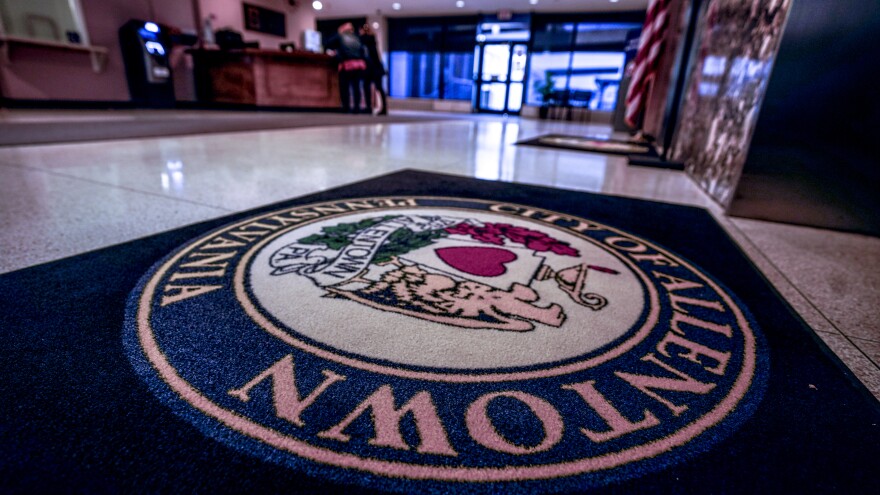ALLENTOWN, Pa. — Members of the city’s Environmental Advisory Council on Tuesday voiced support for the $300 million Kline’s Island Sewer System, or KISS, regional wastewater plan.
Lehigh County Authority’s plan “addresses long-standing wastewater management challenges in our region while supporting the environmental goals outlined in the EAC’s purpose and mission,” according to a letter members unanimously approved to submit to the nonprofit wastewater utility.
The plan is under local review, and late last month was approved by Lehigh County Planning Commission. Tuesday was the last day to submit comments.
“It’s a very important effort, and we didn’t think we should just stand silently by."Tinku Khanwalkar, co-chair of the EAC
“The Allentown EAC concluded that we wanted to be supportive of this whole thing,” EAC Co-Chair Tinku Khanwalkar said.
“It’s a very important effort, and we didn’t think we should just stand silently by. So even though it’s not advice to the city, we felt that this was important enough relating to the city’s assets.”
The Act 537 plan, which is years in the making, aims to upgrade wastewater infrastructure over the next decade across more than a dozen municipalities, including the city and its Kline's Island Wastewater Treatment Plant on Union Street.
Goals met
The vote came at the very beginning of a special meeting of the EAC dedicated to a mid-year goal review.
Members outlined the progress on 10 goals set for the year, as well as more than a dozen secondary goals.
Goals included collaborating with local organizations such as the Da Vinci Science Center and Promise Neighborhoods of the Lehigh Valley, and supporting the city’s Earth Day events and energy efficiency projects.
“I think, so far, it’s been pretty much success[ful] on most of" the defined goals, EAC Chairman Kyle Ropski said. “We got some that have the boxes officially checked 'success,' so I’m happy to hear that.”
The city’s electric vehicle pilot is advancing after getting Alternative Fuel Incentive Grant, or AFIG, funding for eight vehicles and chargers.
“Public Works is working on that ordinance to allocate some of that grant funding ... so that we can purchase those vehicles before the Sept. 30 deadline related to the tax credits,” city Sustainability Coordinator Veronika Vostinak said.
“And then the tax credits for the chargers don't expire until June of 2026, so we have longer to install the chargers than we have to purchase the vehicles.”
Goals stymied
However, some goals were stymied by federal funding freezes or cuts under President Donald Trump and the U.S. Department of Government Efficiency.
A $200,000 grant to Promise Neighborhoods earmarked for creating an urban and community forestry workforce development program most likely is gone.
“I have to confirm, but I believe, at this point, it’s gone,” Khanwalkar said. “We’re not going to be able to do anything with the tree planting in the Jordan Heights neighborhood.”
However, the city has retained a grant from the U.S. Department of Agriculture’s Forest Service for tree plantings.
"Even though they do not have this money, I think we could still get some trees in that neighborhood,” Vostinak said.
“And we can talk more specifically whether it's with Promise Neighborhoods or another group, talk a little bit more about what that would look like, because that neighborhood is squarely within the eligible area.
"So I think we could still get trees.”
In addition, a $50,000 grant to the Unidos Foundation, 2030 Tilghman St., is believed to be canceled because it’s tied to federal funding.
Noting the Trump administration is “not positively looking toward environmental justice,” Ropski said he attached the state Department of Environmental Protection’s map of Environmental Justice Areas to the council’s goal review document.
“Because, if you do pull the mapping tool up and you look over the city of Allentown, almost the entire city is indicated as an EJ area,” he said.
Editor’s Note: Tinku Khanwalkar, who is quoted in this report as co-chair of the Allentown Environmental Advisory Council, also serves on the board of directors of Lehigh Valley Public Media, the parent organization of LehighValleyNews.com. Her involvement with the board had no influence on the reporting or editorial decisions related to this story.


